An injury can bring an unexpected roadblock in your fitness journey. The pain can slow you down, and severe ones may hinder your mobility. It is even worse if you are an athlete or a sportsperson. An extended healing period can affect your long-term performance and career goals. Bouncing back quickly should be your top priority to prevent the worst implications. While there are no shortcuts to recovery, you can do your bit to speed up the process. A little effort gets you on the road to recovery and prevents the frustration that comes with injuries. Here are some therapist-backed tips to bounce back from a sports injury sooner than later.
Get first-aid immediately
Getting first aid immediately should be on your mind after an accident. Besides reducing pain, early treatment minimizes the risk of infection and complications down the line. Minor sports injuries are easy to handle with basic first-aid at home. But it is better to seek a diagnosis from a specialist, even for scrapes and cuts, if you are into professional sports. The last thing you want is an underlying issue surfacing days later.
Modify your activity
Experts recommend modifying your activity instead of giving up altogether after an injury. Start with rest, ice compress, and elevate (RICE), and seek advice for a comeback from a personal trainer. They can help you pick exercises that do not stress the injured part but keep the rest of the body fit and active. You can eventually start working on the injured area because not using it at all may cause muscular atrophy and require a longer rehabilitation.
Seek medical intervention without hesitation
You may address some injuries with rest and first-aid, but do not overlook the more severe ones. Sports medicine specialists at Main Line sports medicine advise seeing a practitioner if you notice red flags like extreme pain, swelling, and mobility issues. They can dig deep to understand the deep-seated issue, use reliable diagnostic procedures to identify injuries, and suggest a viable treatment plan to speed up recovery. They also provide a personalized care plan to match your goals and lifestyle.

Acknowledge your feelings
Bouncing back from a sports recovery takes more than physical treatment. You also need to acknowledge the negative feelings and let go of them to heal mentally and emotionally. A sports medicine expert can help you deal with all aspects of recovery. You may consult a therapist if you need help to regain control over your mind and emotions. Being mentally strong is the key, so you should not hesitate to seek professional help for it.
Work your way back slowly
Sports injuries do not heal overnight, so you must take a realistic approach toward the recovery timelines. The body fails to work at its optimal capacity after an injury damages your bones, muscles, joints, and ligaments. You can rely on rehabilitation and physiotherapy to accelerate injury recovery. Focus on physical and mental well-being to get back on track at the earliest.
Conclusion
An active lifestyle makes you injury-prone, and you may sustain them despite the best precautions. Knowing how to deal with them puts you in a better place. You can recover sooner than you imagine, provided you take the right approach to physical, mental, and emotional healing.
